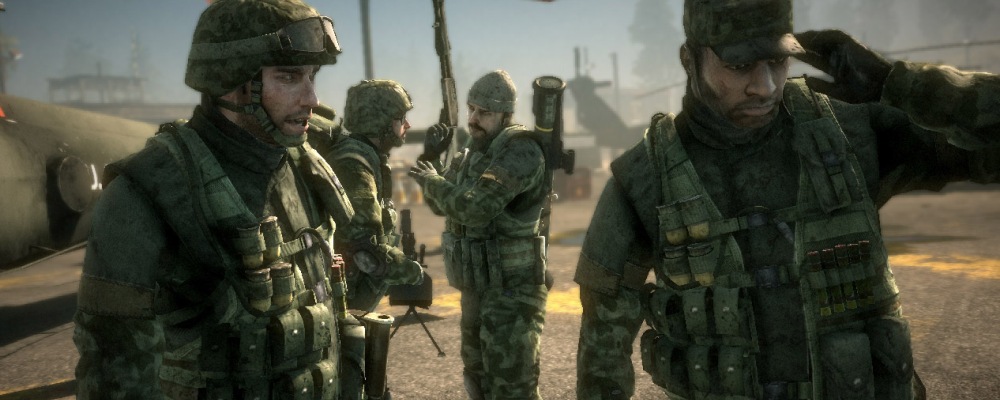“Just tell me your favourite colour, baby!”
Way back in 2009, Charlie Brooker’s Gameswipe had this cutting observation about the po-faced nature of military shooters. During a particularly grim scene in Call of Duty: World at War, Brooker flambés several soldiers, only to hit the pause button for a sip of Diet Coke. It was a swift reminder that for all the talk of valour, Call of Duty has always been about playing army men in the backyard. Eventually, it got to a point where serious real world messages sat awkwardly next to hyper-realised spectacles.
And those aiming for the banter of Generation Kill always gave us Navy SEALs instead.
Battlefield: Bad Company was different, though. With a plot lifted straight from Kelly’s Heroes and an attitude more in line with Robert Altman’s M*A*S*H, the boys from B-Company were designed to lampoon and buck the trend. They were cynical, subversive, Machiavellian, and all the more humorous for it. This wasn’t a game about faux-heroics. This was about getting your own reward on your own terms. And by the end of it, you really wanted them to succeed.
Much like Kelly’s Heroes, Bad Company is a heist story first, war story second. What Marlowe and his squad try to achieve is pure robbery, plain and simple, and usually that can only lead to two things in a video game:
- Karmic retribution or a bittersweet resolution.
- The lead writer decides you have to grow a conscience and fight for the bigger picture.
But B-Company doesn’t fit into the usual criminal mould, and for that they avoid the usual trappings. They’re portrayed as blue collar workers in a shit paying job, tired of each other and of the country they’re stuck in. But it’s those clashes of personalities (and yes, dreams of owning a Truckosaurus Rex) that makes them endearing to us.
They’re you and me. Only they just so happen to be soldiers, too.

As the new guy, Preston Marlowe is as good an avatar as any. He’s eager to get into the action and take orders, but he also delivers a sly narration worthy of 70’s Elliott Gould. We’re supposed to feel the same way as him, taking part in crazy set-pieces while making note of certain extremities, like flying a golden helicopter into enemy territory.
But flying a golden helicopter is nothing in the grand scheme of things. These are desperate men, willing to die for something tangible and not for the detached whims of others. The beauty of Preston’s cohorts – Haggard, Sweetwater, and Sgt. Redford – stems from their disillusionment of being a soldier. That gold bullion is merely a character defining McGuffin.
Sweetwater might be the panicky voice of reason, but all that reason goes out the window because of his infatuation with Mike-One Juliet, their sympathetic radio liaison. Haggard is in his element, revelling in his Gold Rush roots; his one man invasion poking fun at the invincibility of video game troops. And then there’s Sgt. Redford, who at first seems to be your typical Sgt. Apone knock-off, but ends up being quite the antithesis of that. He’s more Danny Glover than Al Matthews; Murtaugh (Lethal Weapon) and Harrigan (Predator 2) rolled into one.
There’s a real litmus test for these characters about two thirds of the way through. At one point, Marlowe has to rescue the others on his own. As the action intensifies around a small hamlet, with all these exploding walls and deafening gunshots breaking the speakers, you come to realise something’s missing. There’s no dumb banter, no reassurances, no panic, nothing. Bad Company’s world is suddenly more lifeless without your “friends.” It’s also a reminder that, yes, the stakes are genuinely high, layering your resolve in the process. The odds are stacked against you, but these guys deserve that reward more than ever.
That’s a sign of a good script, where characters and plot work together, pushing and pulling in each other’s favour. The comedic clashes might be come from an obvious place, especially with Sweetwater and Haggard, but it’s also the heist that defines B-Company. That’s why, personally, Bad Company works better than its sequel.

Bad Company 2 feels more like The A-Team, and without anything truly personal at stake, B-Company drifted away from our original impressions, al a Ghostbusters to Ghostbusters 2. Marlowe and co. were still goofy, but now they were instilled with heroism and selflessness (especially at the end), and no amount of snide remarks to Modern Warfare 2 would hide that shift in characterisation.
There’s little doubt that there was some focus testing going on, and we all know what EA thought of the original by now. Humour meant low sales! That was the problem, yeah! So we ended up with the no-nonsense Battlefield 3.
And you remember the memorable cast of Battlefield 3, right? No? How about anyone from Battlefield 4 that wasn’t Michael K. Williams? Ah…
When you look at Battlefield: Hardline’s campaign, there’s some sense that they’re trying to recapture that Bad Company magic. It’s got heart, but never in the right place; starting off like The Shield and Miami Vice, before turning into Burn Notice, and eventually into any number of 90’s action movies. You’re either one thing or your not, and in these PR disaster days for America’s police forces, you may as well just embrace Bad Boys and Lethal Weapon and give it a Last Action Hero spin.

You see, in Bad Company, nobody cares about the war as much as you do with that controller in your hands. It’s a backdrop that colours in this cast of misfits and gives you an excuse to make detours through abandoned houses.
So the games were deemed lower-than-expected with their sales. So what? That’s okay. In fact, that totally fits in with Bad Company’s theme. Marlowe, Sweetwater, Haggard and Sgt. Redford were never going to change the world, but they were always going to be your underdogs.


